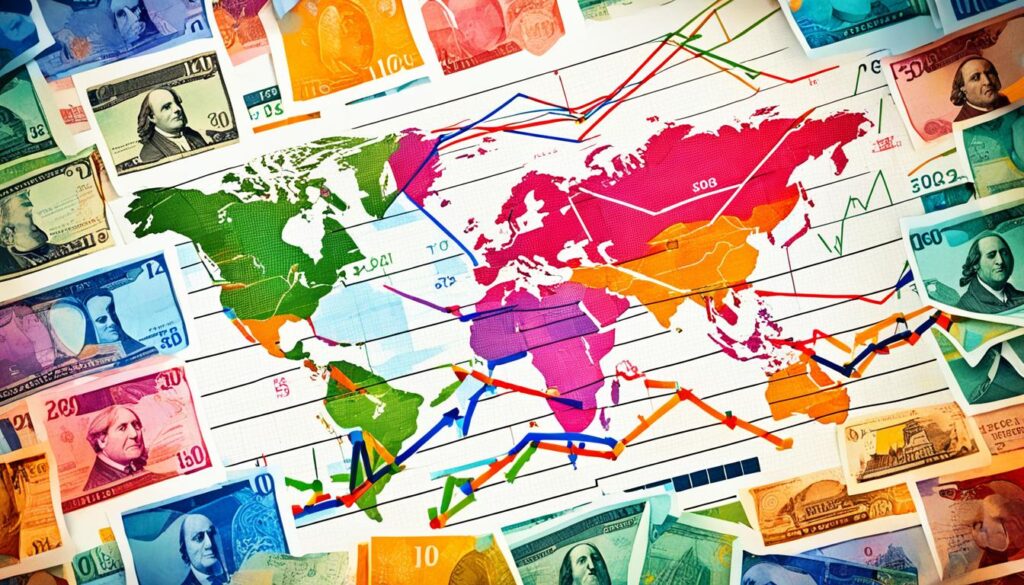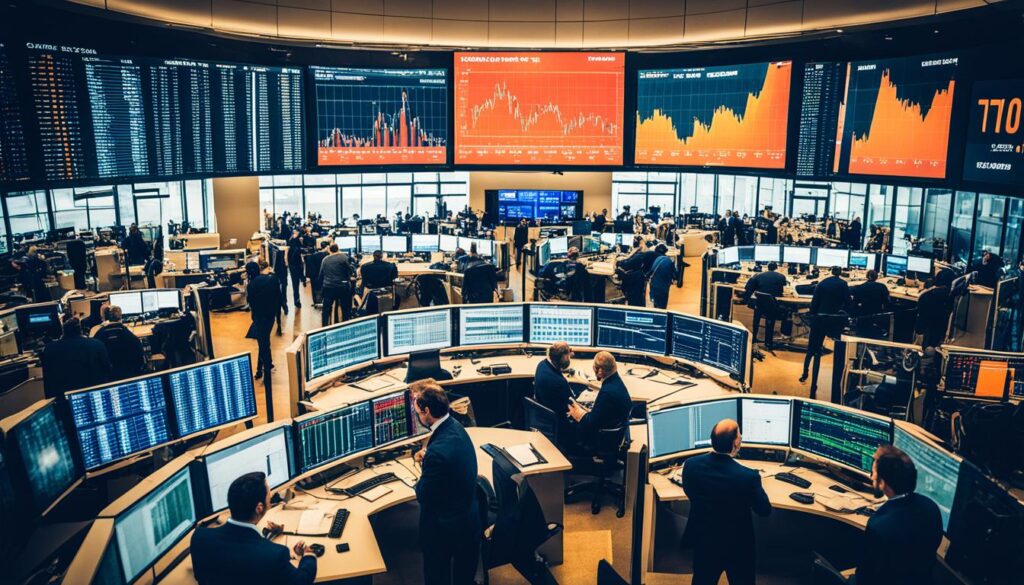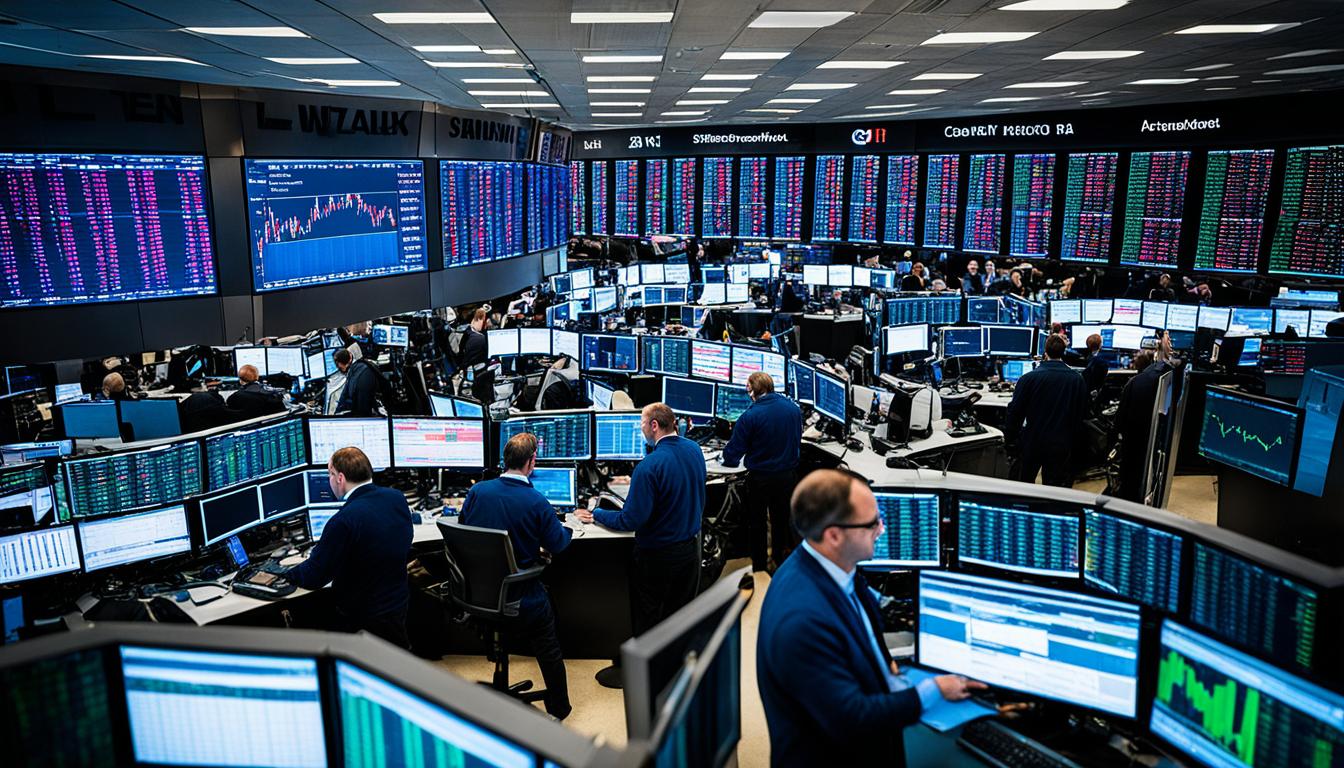The financial markets are where people trade financial items like stocks, bonds, currencies, and more. They are crucial for the economy. They help businesses and people get money and let investors make more money.
There are many ways to invest. You might buy a piece of a company in the stock market. Or, invest in government or corporate debt in the bond market. Forex market lets you bet on currency value changes. The derivatives market offers unique financial products tied to stocks or commodities.
Today, the financial markets offer even more options. This includes the cryptocurrency market and the growing market for commodities, such as energy and precious metals. As the world of finance changes, investors look for new ways to make money and spread their risks.
Key Takeaways
- The financial markets encompass a wide range of marketplaces where various financial instruments, including stocks, bonds, currencies, commodities, and derivatives, are traded.
- These markets play a crucial role in the functioning of capitalist economies by facilitating the flow of capital and enabling businesses and individuals to raise funds.
- Investors can participate in a variety of asset classes, each with its own unique characteristics, risks, and potential returns, such as the stock market, bond market, foreign exchange market, and derivatives market.
- The financial markets have also seen the emergence of newer and more specialized investment opportunities, such as the cryptocurrency market and the expanding commodities market.
- As the global financial landscape continues to evolve, investors are increasingly seeking to diversify their portfolios and explore new sources of return.
Stocks and Equities Markets
The stock market lets investors buy and sell shares in publicly traded companies. It’s a key place for capital flow. Businesses use it to get funds and investors aim for capital gains and dividends.
Primary vs Secondary Markets
The primary stock market is for selling new stocks. This often happens with an initial public offering (IPO). It’s a chance for companies to offer their shares, letting investors join in their growth. The secondary market is where investors trade already-owned stocks. This allows for easy buying and selling and helps set fair prices for these financial assets.
Types of Investors and Market Participants
The stock market sees many players, including individual traders and big players like mutual and pension funds. It also includes market makers and brokers who help with trading. Everyone brings their own ideas and strategies to the table, affecting the market in different ways.
Opportunities in Smaller-Cap and Value Stocks
While the big New York Stock Exchange (NYSE) and NASDAQ are home to large-cap stocks, there’s more to the equity market. Smaller-cap and value stocks can offer exciting chances for capital gains. Yet with these opportunities come greater risks. Smart investors might look at these areas for a part of their investment plan to embrace these unique markets.
| Characteristic | Large-Cap Stocks | Smaller-Cap Stocks | Value Stocks |
|---|---|---|---|
| Market Capitalization | $10 billion and above | $2 billion to $10 billion | Lower price-to-earnings (P/E) ratio |
| Risk Profile | Lower volatility | Higher volatility | Generally lower risk |
| Return Potential | Moderate growth | Potential for higher growth | Potential for capital appreciation |
| Examples | Apple, Microsoft, Amazon | Avis Budget Group, Greenbrier Companies | Exxon Mobil, Chevron, Pfizer |
Bond and Fixed-Income Markets
The bond market is where different groups, like governments and companies, borrow money. They sell debt items to raise funds. Buyers of these items get regular payments and their money back when the term ends.
Government vs Corporate Bonds
U.S. Treasury bills, notes, and bonds are among the safest investments. They’re safe because they have the government’s full support. However, they offer lower returns compared to corporate bonds. Investors need to check how safe a company is before buying their bonds.
Opportunities in Inflation-Linked Bonds
Treasury Inflation-Protected Securities (TIPS) help in fighting inflation. Their value goes up as prices rise, protecting the real worth of your money. They’re great for buyers who want to guard their funds against inflation.
Foreign Exchange (Forex) Market

The forex market lets people trade, protect, or guess on currency rates between different countries. It’s the most active market globally, with trades over $7.5 trillion a day. This is more than the futures and stock markets combined.
This market works everywhere with no central place. It includes traders, central banks, commercial companies, and more. They like it because it’s easy to turn investments into cash and you can borrow money to make your trade bigger.
Forex trading happens 24/5, thanks to financial centers in places like New York and Tokyo. This non-stop trading means prices quickly change when new economic or political news comes out. It can also be risky but very rewarding with the right knowledge.
The ability to use a lot of borrowed money in forex attracts many. It can make your wins or losses bigger. But, it also means you could lose a lot of money. So, companies that offer these services watch closely to prevent large losses for their clients.
| Participant | Role in the Forex Market |
|---|---|
| Central Banks | Intervene in the forex market to stabilize their domestic currency or influence exchange rates |
| Commercial Companies | Engage in forex transactions to hedge their exposure to exchange rate fluctuations and facilitate international trade |
| Investment Management Firms and Hedge Funds | Speculate on currency movements to generate returns for their clients and investors |
| Investors | Participate in the forex market to diversify their investment portfolios and capitalize on exchange rate changes |
The forex market is full of chances but also risks. Knowing who’s involved and what drives currency prices is key. This information is vital for anyone looking to trade successfully in the global market.
Derivatives Markets
The derivatives market is part of the financial world. Investors trade things like stocks, bonds, or commodities. They use items like futures contracts and options contracts. You can find these on places like the Chicago Board Options Exchange and the Chicago Mercantile Exchange. There are also over-the-counter (OTC) derivatives . These are trades between two people directly.
Futures and Options Markets
The futures market lets people agree to buy or sell an asset at a future date. Say stocks, interest rates, currencies, or commodities. These deals are set and done through markets. They can help protect against price changes or guess on the market.
The options market gives the choice to buy or sell at a set price later. This happens within a limited time. Options are great for safety, guesses, or making money. They allow investors to handle their dealings with different assets in flexible ways.
Over-the-Counter (OTC) Derivatives
The over-the-counter (OTC) derivatives market is less formal. It’s where people make customized deals. You can find things like swaps and exotic options. These are made to fit someone’s very specific needs.
| Type of Derivative | Description | Examples |
|---|---|---|
| Futures Contracts | Agreements made outside markets to buy or sell something later at a set price | Stock index futures, interest rate futures, currency futures, commodity futures |
| Options Contracts | Agreements made outside markets. They give the holder the right to buy or sell at a certain price by a certain time | Stock options, index options, currency options, commodity options |
| Over-the-Counter (OTC) Derivatives | Specialized contracts traded specifically between two parties, not on public markets | Swaps, forwards, exotic options |
Commodities Markets

The commodities market plays a key role in the world’s financial scene. It provides a place to trade physical goods. This includes things like crops, energy, and rare metals. Here, suppliers, buyers, and investors can meet. They influence the prices we pay for things we need.
Spot vs Derivatives Trading
Two main ways exist to trade in commodities—spot and derivatives markets. In the spot market, goods are bought and sold for immediate cash. The derivatives market, however, deals in contracts tied to these physical goods. These agreements are based on the future’s estimated prices. In doing so, those in the derivatives market can either reduce their risks or seek to make a profit.
Energy and Precious Metals
Energy products like oil, gas, and carbon credits are part of the vast commodities market. So are precious metals like gold and silver. These items keep the world’s economy moving, with their trading markets seen in places like the Chicago Mercantile Exchange and the Intercontinental Exchange. People invest in commodities for various reasons. One big reason is to keep their investments balanced. This is because the prices of goods often don’t move together with other common types of investments.
Cryptocurrency Markets

The cryptocurrency market is new and changes quickly. It lets us trade digital coins and tokens worldwide. Many cryptos are available and traded on various online platforms. These places vary, but they usually are either controlled by a company or work without one.
Centralized vs Decentralized Exchanges
Centralized exchanges, like Coinbase, Binance, and Kraken, work in a traditional way. They manage trades, hold onto digital money, and control how things are bought and sold. Then we have decentralized exchanges (DEXs) such as Uniswap and PancakeSwap. They don’t need a company to oversee trading. People can trade directly, using their own digital wallets.
| Feature | Centralized Exchanges | Decentralized Exchanges |
|---|---|---|
| Custody | Exchanges hold users’ cryptocurrency assets | Users maintain custody of their own assets through digital wallets |
| Trading Mechanism | Order book-based, with the exchange acting as the intermediary | Automated market maker (AMM) model, without a centralized order book |
| Regulation | Subject to financial regulations and oversight | Generally less regulated, with a focus on decentralization and self-custody |
| Trading Pairs | Offer a wide range of trading pairs, including fiat-to-crypto and crypto-to-crypto | Typically offer a more limited selection of crypto-to-crypto trading pairs |
| Liquidity | Generally higher liquidity due to the centralized order book and larger user base | Liquidity can be more fragmented and lower, but may offer better privacy and control |
Choosing between a centralized or decentralized exchange is about what you value. It affects how safe, in control, and easy trading and investing can be. It’s important for people in the crypto market to think about what’s important to them. Then they can pick the best site for their needs.
Financial Markets
Financial markets are key players in capitalist economies, making the exchange of capital smooth and encouraging economic growth. They act as the middlemen, linking those with extra money (investors/lenders) to those needing more money (borrowers).
Role in Facilitating Capital Flow
They allow capital to be allocated efficiently by offering a space for trading financial instruments like stocks and bonds. This movement of capital is crucial for growing businesses, pushing innovation, and boosting economic growth.
By uniting investors and borrowers, the system aids in the smooth exchange of information. This exchange is critical for productive capital markets.
Importance of Transparency and Liquidity
Transparency and liquidity are key for financial markets to work well. Clear market information and strong regulations make sure investors can choose wisely. Big liquidity means trades can happen quickly and the fair value of financial assets is known.
Global Markets and Investment Opportunities

The U.S. stock market has shone in recent years. But, wise investors should look at other markets too. They can find chances for big returns in global financial markets. In Asia, emerging markets and the fast-growing China tech sector are great for growing your investments overseas.
Emerging Markets and China Technology
Places like China, India, and Brazil are growing fast. They offer a chance to benefit from the global middle class getting stronger and spending more. China’s tech places, Shenzhen and Beijing, are booming with innovation too. This is a great time for investors to possibly make a lot of money.
UK and European Energy Stocks
In Europe, especially in the UK, energy stocks are looking good. As the world moves to renewable energy, these stocks could do well. They have good prices and could give great returns to those with diverse investments.
| Market | Sector | Valuation | Risk | Return Potential |
|---|---|---|---|---|
| Emerging Markets | Technology | Moderate | High | High |
| UK/Europe | Energy | Attractive | Moderate | Moderate-High |
By looking at global markets and investing in areas like tech in emerging markets or energy in Europe, investors could boost the returns on their risks. This can set them up for success over time.
Also Read: Need Help Organizing Your Finances? Meet The Finance Planners
Conclusion
Conclusion
The world of finance is vast, offering many chances for investors to make money and lower their risks. You can invest in stocks, bonds, or even different currencies from around the world. There’s also the option to invest in things like gold or new digital currencies like Bitcoin.
Diversifying investments means spreading them out over different areas. By doing this, investors can hope to gain more profits while not risking everything. The mix of stocks, bonds, currencies, and more makes for an exciting and changing field. Those who understand how it works can spot and take advantage of new chances.
The finance world is always changing. Staying alert and informed is key for investors. They need to keep up with trends, laws, and new technologies. By doing so, they can manage risks better and meet their investment goals.
FAQs
Q: What are the different types of financial markets?
A: Financial markets can be categorized into various types such as capital markets, bond markets, money markets, and securities markets.
Q: What functions do financial markets serve?
A: Financial markets provide a platform for investors to buy and sell financial securities, facilitate risk management, and help in determining market prices through supply and demand dynamics.
Q: How do securities work in financial markets?
A: Securities are financial instruments that represent ownership in a company or debt owed by an entity. They are traded in financial markets based on market conditions and investor preferences.
Q: What is the role of portfolio management in financial markets?
A: Portfolio management involves creating and maintaining an investment portfolio that aligns with an investor’s objectives and risk tolerance by diversifying assets across various financial instruments.
Q: How do markets operate in the context of financial instruments?
A: Markets function by matching buyers and sellers of financial instruments, such as stocks, bonds, and mutual funds, to facilitate transactions at market prices determined by factors like supply and demand.
Q: How do financial markets contribute to investment activities?
A: Financial markets play a crucial role in enabling investors to buy and sell securities, raise capital through new issues, and engage in investment banking activities to support economic growth.
Q: What is the significance of risk management in financial markets?
A: Risk management in financial markets involves assessing and mitigating potential risks associated with investments to protect investors’ capital and optimize return on investment.





